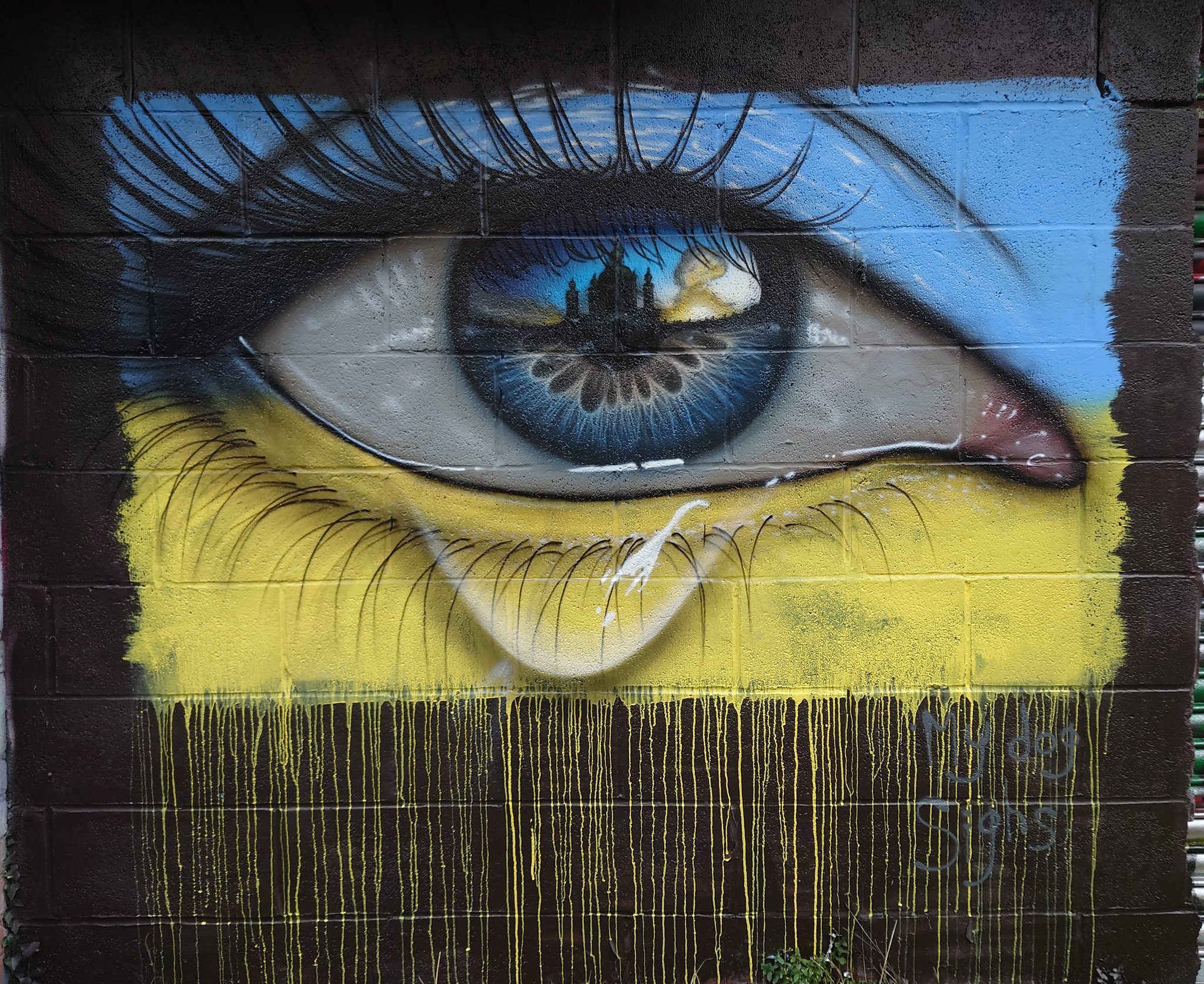Ampersand Gazette #6
“Trump and Putin sowed the seeds of their own destruction. They wanted all of the attention and credit. Now they deserve all of the blame.”
Maureen Dowd
from an Opinion piece “While Putin Shrinks, Zelensky Soars” in The New York Times
March 20, 2022
Maureen Dowd’s words, as harsh as they are, gave me hope, no, give me hope. Hope that enough of the world sees the facts to discern the Truth about these two petulant boy-men to rise up wherever it’s needed and speak that Truth to faux power.
It doesn’t matter what your brand of activism is: mine is writing, hence these words, but it’s also voting when required, engaging in thoughtful dialogue on difficult subjects, soothing the ambient fears of my clients, and assuring myself that humanity will, ultimately, do the right thing—because it is the right thing.
Oh, and pray, Beloved. Pray, yes, for the Ukrainians, but also for the Russian people who, by and large, are against this war crime their alleged leader is perpetrating upon innocent people for the sake of his own aggrandizement. And for the US, that we do the right thing. And NATO. And all the rest of the world, much of which is mesmerized by the images of horror we can see on our screens any time of the day or night.
&
“In the end, all these demands boil down to one thing, ancient and metastatic: racism.”
Charles M. Blow
from an Opinion piece “Demanding That Ketanji Brown Jackson ‘Show Her Papers’” in The New York Times
March 7, 2022
Initially, I was offended by Charles M. Blow’s title about Judge Jackson ‘showing her papers,’ but the more I’ve read of what Republicans have so blithely tossed into social media as comments on her nomination, the more I, sadly, have had to agree with Mr. Blow.
First, no man would ever face the kinds of accusations being made. Second, I daresay, no white woman would either.
The thing that got me in Mr. Blow’s words was the word metastatic. It’s a word most of us know from medical language around various kinds of cancers. Literally, it means beyond the status from one point to another. I have to agree. Racism, especially systemic racism, is metastatic in the West.
I’m grateful for the Charles M. Blows of the world for having the courage to name it—over and over and over again. It is much needed until all of us can say it’s true, and resolve to change it.
&
“This shambling behemoth of a national experiment called America slowly, and in spite of itself, learns. We’ve come to understand our own, at times, hubris. We’ve learned that who’s in charge makes a difference. We will continue to make mistakes: I have always cherished a theme in the musical “1600 Pennsylvania Avenue,” with music by Leonard Bernstein and lyrics by Alan Jay Lerner, underlining that America is an experiment ever in rehearsal. Maybe now, with what we’re witnessing, we’ll learn to put our own domestic woes into perspective—the problems that seem to consume us might seem less onerous in comparison to Ukrainians living in makeshift bomb shelters and civilians picking up rifles to defend against a hostile neighbor.”
John McWhorter
from an Opinion piece “The War in Ukraine Puts America’s Problems in Perspective” in The New York Times
March 9.2022
I loved the idea that democracy in America is in rehearsal, and that the notion comes from a musical. Of course it is and of course it does. The founding fathers knew they’d proposed an experiment. Experiments, by their nature, yield results, which then yield changes to the originating experiment. We all learned that in science class in the fifth grade.
Think, Beloved, just briefly, of the images that you have seen this week from Ukraine. Glimpsed, not even really looked at. Do they not speak a language so much more terrible than our problems here would? They do.
Perhaps it’s time to take some advice from one of Dolly Parton’s anthems, “Better Get to Livin’”? Dolly writes, “I said you'd better get to livin', givin' / Be willing and forgivin' / Cause all healing has to start with you / You better stop whinin’, pinin’ / Get your dreams in line / And then just shine, design, refine / Til they come true / And you better get to livin'.”
Um, yeah, there’s been a little too much whinin’ and pinin’ in the West to my mind. We’re here, not in Ukraine. Best to get on with livin’ the best we can, and send buckets of love and peace East to those who are really suffering.
&
“Perhaps even more important, we profoundly misunderstand the very nature of art when we think we know in advance what readers—or audience members or gallery visitors—will derive from it. Or, worse, when we presume to tell them what they should derive from it.
“Whether it’s a painting or a film or a play or a dance or a poem or a novel or a sculpture or a symphony or any other artifact of creativity made by a restless, curious, questing human mind, a great work of art finds its completion in the restless, curious, questing mind of the person who encounters it. And there is no predicting how that act of transformation, that experience of utter intimacy, might unfold.
“Great art of every kind allows people to place themselves, safely, into the larger world. It is transformative precisely because it is one way we come to understand our own part in the expansive, miraculous human story. A great work of art reminds us that our own lives, which too often feel small and insignificant, are part of a story that can be full of cruelty and suffering, yes, but that can also be astonishing. Very often it is magnificent.”
Margaret Renkl
from a Guest Essay in Opinion “It’s Possible to Learn the Right Thing From the Wrong Person” in The New York Times
March 14, 2022
Ms. Renkl, as usual, captures whatever she’s writing about, and holds it out to us in her cupped hands. Ah, I think, she knows what art is for. She knows that art shows us ourselves. This is the purpose of art and artists of all stripes.
Art helps us know who we are, where we are headed, and sometimes, even why we are going there. Art places us in our own space, our own time.
What will the art of Ukraine show us in the next decade? How will we learn about ourselves from it? Perhaps we ought to spend more time with our art and our artists? Then we might not be so inclined to make what-is wrong, but instead, to learn from it, and change what we want to change.
&
“My advice to President Biden: Ask playwrights and writers like Lin-Manuel Miranda, Aaron Sorkin, James Patterson, Sarah Ruhl and others if they have some ideas for Democratic messaging.”
Susan Dunn
Williamstown, Mass.
The writer, a professor of humanities at Williams College, is the author of “1940: F.D.R., Willkie, Lindbergh, Hitler: The Election Amid the Storm.”
from a Letter to the Editor in The New York Times on the dreadful political messaging coming out of the Capitol and the White House
March 16, 2022
Oh, my goodness! Even the Letters to the Editor are on it about art and artists. The author cites some talented FDR writers on his speech team and makes recommendations for who Mr. Biden might draft to help.
If I had to guess, I’d say that any one of those four would jump at the chance to speech-write for the Democrats. Or how about Stephen Schwartz, Alan Menken, Dolly Parton, or Barbra Streisand?
&
“At personal levels the energy patterns at the Equinox encourage you to maintain your vibration at the highest level possible bringing more peace into your heart and use it to spread love and positivity far and wide. Be more aware and catch negative emotions when they come up – avoid watching and listening to the news chatter boxes and if you can’t then that’s where rising above to a higher level of understanding helps you detach.
“You may believe you are more able to be at a higher level, but when you pay more attention you might find you are unconsciously acting out in repeated low tone patterns like gossip, judgmental attitudes, jealousy, etc. which affect your family members and others you come in contact with including yourself. Years ago I saw some wise advice, ‘Be careful what you say to yourself, because you are listening.’”
Melissa Stratton, Astrologer
from her Spring Equinox Newsletter
March 20, 2022
I loved Melissa’s wise advice quote! “Be careful what you say to yourself, because you are listening.” Yes, oh yes, you are, as are your children, your friends, your colleagues, your neighbors. But most importantly, you yourself.
You will find, if you dig a little, that to say one thing, and to believe another is very difficult. We have little conviction when we attempt this sort of subterfuge, and both the subconscious mind and the chakra system rebel in the fact of just such cognitive dissonance.
Spend some time this week thinking about what you’re saying, Beloved. If you like it, swell. But if you don’t, change it. Really. It’s vital for health, for well-being, for happiness that we live in our own integrity, congruently on all four levels of being: body, heart, mind, and spirit.
&
The Rev. William Barber II
“But when he looks at you and talks to you, you know that he possesses something at his core that eludes most others: surety. His sense of purpose and vision for his life is unobscured and unencumbered. This is a man on a mission, the grandest and most noble of missions: to save a country and his countrymen from themselves, to insist that morality ought to dictate policy.
“Barber, to me, is a modern-day Moses.
…
“He has since broadened his mission to include what he calls the “five interlocking injustices”: systemic racism, systemic poverty, ecological devastation, the war economy, and the distorted moral narrative of religious nationalism.
…
“Barber is a holy warrior at a time when secular activism is ascendant. In that way, he is a bit of an anachronism. He is aware of it, and clever in his negotiation of it. He talks more about morality than about theology. He positions himself above anything that might divide. His vision encompasses all—all religions, all races, all sexuality and gender expressions.”
Charles M. Blow
from an Opinion essay “Modern-Day Moses” in The New York Times
March 10, 2022
And here is the answer to the how question: “He positions himself above anything that might divide.” This is where we Ampersanders attempt to live. We do not always succeed as well as
The Rev. Barber—his is a mission of singularity. He is not a householder or an anything except a holder of this moral container. We must balance many, and differing, demands.
What Moses did, and what Rev. Dr. Barber does is stand as a symbol of what might be. We all need symbols, Beloved, to remind us, to inspire us, to keep us focused on what’s important. It’s no mistake that the image I chose for iAmpersand.org is a symbol.
&
Like Moses, like Rev. Barber, we too choose a world predicated on And and not Or anymore.
&
In personal news, there should be an announcement about the chakra workbooks very soon. I’m getting excited to have them out in the world.
Until next time, be &,
S.




